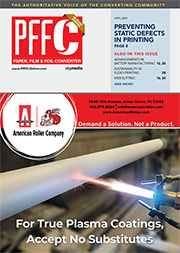Featured Stories
-
Advantages of Shear, Razor and Crush Web Slitting Techniques
When choosing a slitting method, many factors must be considered, including interaction with inspection systems. -
Revolutionizing Lithium-lon Battery Manufacturing Advances in Slot-Die and Electrode Coating Technology
As the global battery market surges toward an estimated $328 billion by 2028, innovations in manufacturing processes are becoming increasingly... -
Nordson Divisions Collaborate to Achieve Unprecedented Flat Profile Time
Nordson Measurement & Control Solutions (a division of Nordson Corporation) is a global leading provider of gauging systems for the film...
News | New Products
-
Morris Packaging to Add New KY Flex-pack Plant
Bloomington, IL-based Morris Packaging plans to build a new $60.9-million production plant in Marion County (KY), a project that will create 276 full-time jobs.
-
Press Belt Manufacturer IPCO to Focus on Engineering and Service Expertise
IPCO will use Ligna 2025 to highlight the service and support services it provides to press manufacturers and WBP producers alike.
-
INX promotes seven Executives to Vice President positions
INX International Ink Co. has announced the Board of Directors has approved the promotions of seven key people to Vice President positions.
-
Bimec and Flex CA Strengthen U.S. Market Presence with a new installation at Cello-Wrap Packaging Inc.
Bimec and Flex CA proudly announce a new milestone in their U.S. market expansion with the recent commissioning of a state-of-the-art slitter rewinder at Cello-Wrap Packaging Inc, located in Farmersville - TX.
-
New Era Converting promotes industry veteran Stephen Pickett to controls engineering manager
New Era Converting, an IPCO company, has announced that Stephen Pickett is taking on a new role as controls engineering manager.
-
Fedrigoni Announces New Slitting Center for Self-Adhesive Labels in Germany in Q4 2025
The Fedrigoni Group - a world reference in the manufacturing of self-adhesive labels, special papers for packaging and other creative applications, graphic supports for visual communication and RFID
-
Advancing Label Innovation Through Collaboration
Packaging is a physical representation of a brand’s identity, and label converters play an essential role in bringing the packaging experience to life.
Expert Advice
Supreme Court Decision Gives Employers Leeway in ADA
- Published: August 01, 2002, By Sheila A. Millar, Attorney-at-Law, Keller & Heckman, Washington, DC
In the third of recent, important decisions involving the Americans with Disability Act (ADA), the US Supreme Court unanimously ruled the ADA allows an employer to refuse to hire a person with a disability where that disability poses a direct threat to the individual when performing a job. The case is Chevron USA Inc. v. Echazabal.
Decisions addressing the scope of the ADA are critically important to converters, suppliers, and their customers, whose facilities may involve exposure to chemicals or other materials potentially harmful to individuals with certain medical conditions, or whose disabilities may impair their ability to do a job safely.
The facts of the case decided by the high court are as follows: The employee, Mario Echazabal, worked for a contractor of Chevron USA Inc. In 1996 Mr. Echazabal applied for employment directly with Chevron. The oil giant offered Mr. Echazabal employment, conditioned upon successfully completing a medical exam. The testing physician found liver damage and said continued exposure to toxins at the Chevron facility would lead to further liver damage.
Chevron withdrew its offer of employment to Mr. Echazabal and informed the contractor, Mr. Echazabal's employer, either to reassign him to a job that would not involve exposure to potentially damaging toxins or to remove him from the refinery. The contractor laid off Mr. Echazabal, and he filed suit against Chevron, alleging it violated the ADA.
The Supreme Court ruled an employer may refuse to hire an individual if, based on a reasonable medical judgment regarding that individual's medical condition, his disability would create or aggravate a danger to his own safety or health on the job.
Moreover, the Court noted, the Occupational Safety and Health Act (OSHA) requires an employer to actively ensure it provides a safe and healthful workplace. If Chevron were required under the Americans with Disabilities Act (ADA) to hire persons like Mr. Echazabal, then compliance with OSHA would conflict with the ADA, a result at odds with workplace safety objectives.
The unanimity of the decision is an especially important factor, suggesting rare agreement on the fundamental principle that employers may take into consideration a prospective employee's medical condition in determining the appropriateness of employment.
What should converters do?
A converter, supplier, or customer may require employees to meet physical and medical criteria, and may set those requirements as conditions upon which employment offers are made. However, those criteria must be applied to an individual based on a reasonable medical judgment of that individual.
Arguably, the ADA requires an employer to reassign an individual such as Mr. Echazabal to a position that would not endanger his safety or health, provided doing so would not be an undue burden. If no other job is available, an employer may refuse to hire that employee.
The Court addressed a number of important issues not discussed here; ADA requirements and the Chevron case's assessment of them involve complex issues. Members of the converting industry should be sure to review carefully hiring and accommodation decisions with experienced labor specialists to be sure they are adhering to the applicable requirements.
Sheila A. Millar, a partner with Keller and Heckman LLP, counsels both corporate and association clients. Contact her at 202/434-4143; This email address is being protected from spambots. You need JavaScript enabled to view it.; PackagingLaw.com













